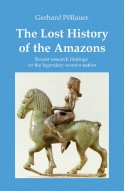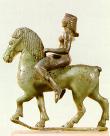 |
--- About 2500 years ago ---The famous Greek historian Herodotus (484 Ė 425 BC) provides the following account about the people at Lake Tritonis: They celebrate a yearly festival of Athena, where their maidens are separated into two bands and fight each other with stones and sticks, thus (they say) honoring in the way of their ancestors that native goddess whom we call Athena. Maidens who die of their wounds are called false virgins. Before the girls are set fighting, the whole people choose the fairest maid, and arm her with a Corinthian helmet and Greek panoply, to be then mounted on a chariot and drawn all along the lake shore. The intercourse of men and women there is promiscuous; they do not cohabit but have intercourse like cattle. When a womanís child is well grown, the men assemble within three months and the child is adjudged to be that manís whom it is most like. Next to the Maxyes of Libya are the Zauekes, whose women drive their chariots to war. |
||
|
|||
 Chott el-Djerid
Chott el-Djerid
|
|||
 |
Giresun Adasi Project |  |
| B o o k s | |
|
Gerhard Pöllauer: The Lost History of the Amazons Recent research findings on the legendary women nation ISBN: 978-1-4461-9305-1; Paperback, 148 pages, 87 black-and-white pictures, 3 illustrations Price: $17.48
This book focuses on the numerous traces of the Amazons.
It reports on latest findings and investigation in the legendary homeland of the Amazons at the
river Thermodon and on the Amazon island Lemnos. |

|
|
Marija Gimbutas, The Living Goddesses
It is astonishing that Gimbutas' key assumption that there existed egalitarian societies prior to the invasion of patriarchal Indo-European peoples in Europe is so much criticized and controverted by scholarly circles. Actually, her intriguing findings seem plausible, the numerous pictures in her books make everything very logical. Marija Gimbutas (1921 - 1994) was a serious and profound scientist who dedicated nearly her whole life to archaeological research. She was professor of archaeology at UCLA (University of California, Los Angeles) from 1963 to 1989, and directed major excavations of Neolithic sites in southeastern Europe. She had deep knowledge of archaeology but also of linguistics, ethnology and history of religion. Her theories are well thought out, clearly presented and thoroughly explained. |

|
|
Gerhard Pöllauer, Geheimnisvolles Lemnos. Die von Frauen beherrschte Insel
(Mysterious Lemnos. Island dominated by women) ISBN: 978-3-902096-77-7; Paperback, 128 pages, 97 black-and-white pictures, 3 color photos, 1 map Price: EUR 13.00
The rather unknown North Aegean island Lemnos amazes with its great prehistoric past.
About 5000 years ago there existed a highly-developed civilization which created imposing cities,
mighty rock buildings and impressive sanctuaries on this Greek island. The discovery of Poliochni was sensational.
Because of its largeness and refinement this Bronze Age settlement is regarded as the most ancient city of Europe.
Also the discoveries at Myrina in the west and Hephaistia in the north witness the island's
prehistoric importance. Presumably there was a further city in the Northeast - Chryse, which was sunken under the sea.
|

|
Updated: February 14, 2025
Diese Seite gibt es auch auf deutsch.

|

|

|

|

|

|

|

|
Books on our topic *** Our Projects *** About Us Copyright © 1997-2025 Amazon Research Center |

|